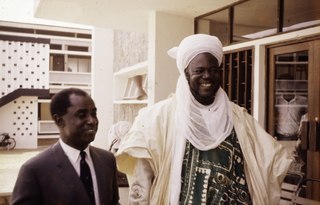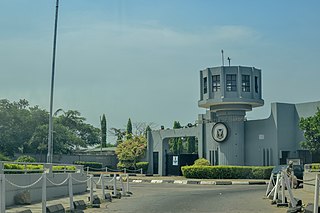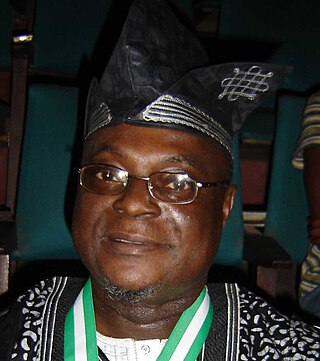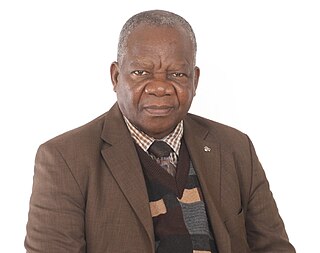
Nnamdi Benjamin Azikiwe, commonly referred to as Zik of Africa, was a Nigerian politician, statesman, and revolutionary leader who served as the 3rd and first black governor-general of Nigeria from 1960 to 1963 and the first president of Nigeria during the First Nigerian Republic (1963–1966). He is widely regarded as the father of Nigerian nationalism as well as one of the major driving forces behind the country's independence in 1960.

Ibadan is the capital and most populous city of Oyo State, in Nigeria. It is the third-largest city by population in Nigeria after Lagos and Kano, with a total population of 3,649,000 as of 2021, and nearly 4 million within its metropolitan area. It is one of the country's largest cities by geographical area. At the time of Nigeria's independence in 1960, Ibadan was the largest and most populous city in the country, and the second-most populous in Africa behind Cairo. Ibadan is ranked one of the fastest-growing cities in sub-Saharan Africa, according to the UN Human Settlements Program (2022). It is also ranked third in West Africa in the tech startups index. Ibadan joined the UNESCO Global Network of Learning Cities in 2016.

Chief Obafemi Jeremiah Oyeniyi Awolowo was a Nigerian nationalist and politician who played a key role in Nigeria's independence movement (1957–1960). Awolowo founded the Yoruba nationalist group Egbe Omo Oduduwa, and was the first Leader of Government Business and Minister of Local Government and Finance, and first Premier of the Western Region under Nigeria's parliamentary system, from 1952 to 1959. He was the official opposition leader in the federal parliament to the Balewa government from 1959–1963.

The University of Nigeria, commonly referred to as UNN, is a federal and public research university located in Nsukka, Enugu State, Eastern part of Nigeria. Founded in 1955 by Nnamdi Azikiwe who was the Governor General of Nigeria between 1960 and 1963, and first President of Nigeria between 1963 and 1966. The University of Nigeria Nsukka was formally opened on 7 October 1960, as one of the first generation universities in Nigeria and is ranked among the top universities in Nigeria and Africa. The University of Nigeria has three campuses in Enugu State–Nsukka, Enugu, and Ituku-Ozalla – and the Aba campus in Abia State.

The Ibadan School of History was the first, and for many years the dominant, intellectual tradition in the study of the history of Nigeria. It originated at the University of Ibadan, in Ibadan, Nigeria, in the 1950s, and remained dominant until the 1970s. The University of Ibadan was the first university to open in Nigeria, and its scholars set up the history departments at most of Nigeria's other universities, spreading the Ibadan historiography. Its scholars also wrote the textbooks that were used at all levels of the Nigerian education system for many years. The school's output is often considered to be most clearly embodied in the "Ibadan History Series".

The University of Ibadan (UI) is a public university located in Ibadan, Oyo State, Nigeria. Initially founded as University College Ibadan in 1948, it maintained its affiliation with the University of London. In 1962, it became an independent institution, making it the oldest degree-awarding university in Nigeria. The University of Ibadan has significantly contributed to Nigeria's political, industrial, economic, and cultural development through its extensive network of graduates.
The Action Group (AG) was a Nigerian nationalist political party established in Ibadan on 21 March 1951, by Chief Obafemi Awolowo. The party was founded to serve as the platform for realizing his preliminary objective of mobilizing Western Nigerians to forestall the NCNC control of the Western Region and the subsequent aim of cooperating with other nationalist parties to win independence for Nigeria. It benefited immensely from the relationships developed in the Egbe Omo Oduduwa formed in Awolowo's days in London as a student.

Babafemi Adeyemi Osofisan, known as Femi Osofisan or F.O., is a Nigerian writer noted for his critique of societal problems and his use of African traditional performances and surrealism in some of his plays. A frequent theme that his drama explore is the conflict between good and evil. He is a didactic writer whose works seek to correct his decadent society. He has written poetry under the pseudonym Okinba Launko.

Adiele Eberechukwu Afigbo was a Nigerian historian known for the history and historiography of Africa, more particularly Igbo history and the history of Southeastern Nigeria. Themes emphasised include pre-colonial and colonial history, inter-group relations, the Aro and the slave trade, the art and science of history in Africa, and nation-building.
Yaba Higher College was founded in 1932 in Yaba, now a suburb of Lagos in Nigeria to provide tertiary education to Africans, mostly in vocational subjects and teaching. The college staff were transferred to start the University College, Ibadan in 1948 and the college premises were used for the new Yaba College of Technology.
Alex Ibru was a Nigerian businessman, founder and publisher of The Guardian (Nigeria) newspaper, who was minister of internal affairs from 1993 to 1995 during the military regime of General Sani Abacha.

Michael Abiola Omolewa is a Nigerian diplomat, scholar, education historian, and civil servant. From September 2003 to October 2005, he served as the 32nd president of the General Conference of the United Nations Educational, Scientific and Cultural Organization (UNESCO). While president, Omolewa led UNESCO to adopt the International Declaration on Human Genetic Data and the Convention for the Safeguarding of Intangible Cultural Heritage. From January 2000 to August 2009, Omolewa served as permanent delegate and ambassador of Nigeria to UNESCO. At University of Lagos, on Wednesday 6 February 2019, Omolewa delivered the 5th Enoch Adeboye Annual Birthday Public Lecture; titled: Peace: The Global Quest.
The following is a timeline of the history of the city of Ibadan, Oyo State, Nigeria.
Ladipo Ayodeji Banjo, was a Nigerian educational administrator and emeritus professor of English who was the Vice-Chancellor of the University of Ibadan, Nigeria. He also served as pro-chancellor of Ajayi Crowther University.
Seth Sunday Ajayi is a Nigerian scientist, scholar and the first African Professor of Wildlife Ecology.
Ayọ̀ Bámgbóṣé is an academic linguist, the first professor of Linguistics in Nigeria. He has made contributions to education and linguistics, achieving recognition in form of honours and election to offices in professional bodies.
Akin Odebunmi is a Yoruba Nigerian Professor of Pragmatics and Discourse Analysis in the Department of English, University of Ibadan. Born on December 21, 1967, he is a widely traveled scholar in pragmatics and intercultural studies.
Nigerian Institute Of Social And Economic Research is a public research institute located in Ibadan. The center is one of the foremost publicly funded think tanks in the country. It is headed by a director-general, Antonia Simbine.

Sustainable Development Goals and Nigeria is about how Nigeria is implementing the Sustainable Development Goals within the thirty-six states and its Federal Capital Territory (FCT). The Sustainable Development Goals (SDGs) consist of seventeen global goals designed as a "blueprint to achieve a better and more sustainable future for all". Each of the 17 goals is expected to be achieved by 2030 in every country around the world.
May Ifeoma Nwoye is a Nigerian author and professor of Business administration. She currently serves as Dean, Faculty of Management Sciences, Nile University of Nigeria.









